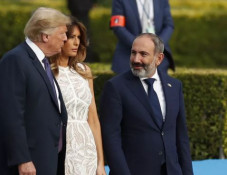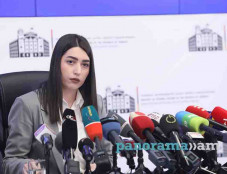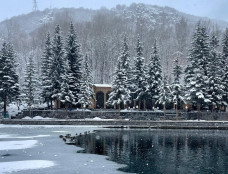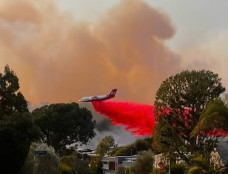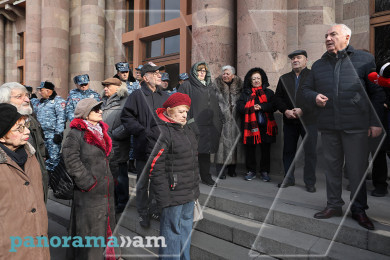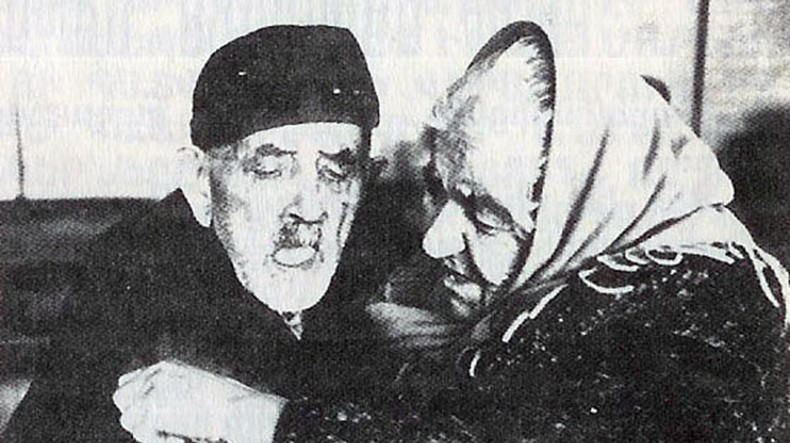
26 years after genocide of Armenians in Baku: Popular Front of Azerbaijan prepared militant squads of 20 or 30 in advance
The tragic January events that occurred in Azerbaijan and its capital in 1990, started with mass hooligan unrests in border districts. In the first days of the month, the extremists perpetrated a destruction of a 169-kilometre-long section of the state border causing a damage of over 5 million roubles. A criminal case was filed against the main perpetrators. Major General of justice V. G. Provotorov writes about the events in an article titled ‘Baku: The Beginning of the Nineties,’ which was published in ‘Military and History Journal’ No 7 in 1990.
According to Maj. Gen. Provotorov, an even more awful crime was committed two weeks later, when 56 people of Armenian nationality were murdered and torn to pieces with the connivance of militia structures. Then, pogroms and lootings of the flats of those who had been forced to leave Baku (700 people) broke out. In other cities, for example in Lenkoran, Neftchal, Jalilabad, the members of the Popular Front of Azerbaijan (PFAz) actually discharged the legal authority of the leadership thus aggravating the highly explosive situation, which led to further disorders and crimes. All the cases of the unlawful actions were thoroughly investigated. Over 200 employees of prosecution, KGB and Interior Ministry of the Union and of the Republic were involved in the case. In addition, the Supreme Council of the Azerbaijan SSR, as well as various organisations, created (as a counterbalance to the official investigation) all kinds of many commissions consisting of representatives of different movements and unions, including the PFAz leaders. Each of them pursued a single aim – to manipulate and falsify facts, to strive to shift the blame of the bloodshed in Baku exceptionally onto the Armed Forces. To finally blacken the latter, they ascribed to them an intentional blind cruelty in the actions connected with the declared state of emergency and the deployment of the troops to the Azerbaijani capital. Moreover, the falsifiers called the deployment of the troops nothing but an invasion.
The author writes that he was in the Azerbaijani capital for more than a month from 20 January 1990 organising the work of a group of military prosecutors and investigators (26 officers), and coordinating their interactions with the main investigative brigade headed by a representative of the investigative department of the KGB of the USSR. He faced the militants’ fire as they were conducting a targeted fire at the military personnel.
“A mass questioning of military personnel carried out during the investigations, as well as documented eyewitness accounts, assume that the PFAz leaders, its extremist wing, had prepared the seizure of the political power in Baku and in other settlements of the republic well in advance,” Provotorov writes.
According to him, realising the importance of possessing a key administrative-political centre like the Azerbaijani capital, those forces set on streamlining the tactics of their actions and creating additional structure of armed groups, the so-called ‘army of liberation,’ in advance (practically, immediately after the state of emergency was cancelled in November 1989).
In the same period, the leadership of the PFAz saw serious transformation as the intelligentsia, which had created that informal republican union to help the perestroika, was pushed to the background, while the ‘headquarters of national defence’ took the superiority in its hands.
Using the mask of the PFAz, the ‘headquarters’ started to prepare its ‘armed forces,’ the so-called militants, who were brought together in squads of 20 or 30. They were managed toughly, had body of instructors and were directed to actions in strictly identified districts and established zones of influence. The subsequent events showed that the armed groups had been created at the steamship line, at Caspneftegazflot, at the taxi station by involving the of medical facilities and route taxis.
The Major General writes that communication systems were elaborated in advance and means to strengthen the armed groups were sought out in the districts where the existing forces might prove insufficient to achieve the final goals. A reconnaissance of the schedule of everyday activities of the troops, as well as of the systems of guard and internal services, was already carried out starting from the first days of January 1990. Cases of the PFAz members, militants’ attempts to make acquaintances with the military personnel with the aim to get arms from them have been recorded. This happened, for instance, in the artillery and missile units, guards, in arm storage facilities. There were also numerous contacts on the roads Baku- Perekeshkul, Guzdek, and others. The soldiers were offered sums ranging from 500 roubles (at the beginning of January) to 5 or even 25 thousand roubles as the tensions rose. Such offers were also made to the conscripts who had arrived to Baku for strengthening the garrison ahead and during the imposition of the state of emergency.
“In fact, the PFAz leaders’ guise of their real goals and objectives was thrown away after the events that took place in Baku on 13 January. Now their main efforts openly targeted neutralising the actions of the Internal Ministry of the republic, testing their opportunities of organising a mass terror, cleavage and stopping of the concentrated actions of the law enforcement agencies. This was intended to achieve with the help of numerous demonstrations of the people in various districts of the city. I must say that the extremists achieved their goal,” Provotorov writes. He adds that the units of the Internal Ministry of the republic appeared incapable of preventing the cases of vandalism and robbery, as the moral and psychological readiness of the militia and the leadership of the republic to show a proper response to the violence was paralysed.
The PFAz leaders clearly realised that the troops of the army would not remain indifferent to the extremists’ unlawful actions on humanitarian grounds. That is why, since January 16, they organised blockings of military units, military schools and cities, of the Red Banner Caspian Flotilla, of the places of compact residence of officers and praporshiks, as well as of driveways to the aerodromes, the Major General writes.
Two days later, the Popular Front of Azerbaijan actually imposed an unlawful state of emergency in Baku. The military core of the PFAz carried out a control of the transport pass system, telephone, including the long-distance, communication, and the work (which it wrecked) of the governmental offices in its manner. The creation of an ‘army of liberation’ headed by E. Mammadov was declared during the demonstrations citing the leaders of the ‘front.’ The ‘commander’ boasted that the he had been granted the rank of ‘colonel’ with the decision of the PFAz. After learning that units of internal troops started to arrive in the city, the leaders of the popular front carried out a mass campaign of involving the residents of the city in a movement of civil disobedience. To that end, they used fake slogans about the military personnel being assigned to eliminate the Azerbaijani population as a retaliation for the Armenian pogroms.
To be continued.
A mass pogrom of Armenian population was committed in Baku from 13 to 19 January 1990 as a culmination of the genocide of the Armenians in Azerbaijan unfolded between 1988 and 1990. After the Sumgait pogroms (26-29 February 1988), persecutions, beatings, particularly cruel killings, public mockeries, pogroms of separate flats, seizure of property, forcible expulsions and illegal dismissals of Armenians started in Baku. Only some 35 or 40 thousand Armenians of the community of 250 thousand remained in Baku by January 1990; they were mainly disabled people, old and sick people and the relatives looking after them. The pogroms took an organised, targeted and mass nature since 13 January 1990. A large amount of evidence exists about the atrocities and killings committed with exceptional cruelty, including gang rapes, burnings of people alive, throwing people out of balconies of higher floors, dismemberments and beheadings.
The exact number of the victims of the genocide of the Armenians in Baku still remains unknown. According to different sources, between 150 and 400 people were murdered, and hundreds were left disabled. The pogroms went on for a week amid a total inaction of the authorities of Azerbaijan and the USSR, as well as the internal troops and the large Baku garrison of the Soviet Army. Those who managed to avoid death were forced into deportation. The Soviet troops were deployed to set order in Baku only on 20 January 1990.
For more detail, visit KarabakhRecords.
Related news
- 26 years after genocide of Armenians in Azerbaijan: “I remember Baku and again feel smell of burnt human flesh…”
- “This is impossible to forget and to forgive”: A Century-Long Genocide. Black January of Baku film demonstrations in US
- 26 years after genocide in Baku: “They called and threatened to finish off with us as they had done with our niece in Sumgait”
- 26 years after genocide in Baku: “Baku received order from Moscow not to intervene in pogroms and allow them easily slaughter Armenians”
Newsfeed
Videos





